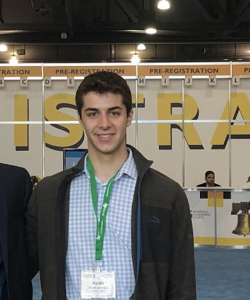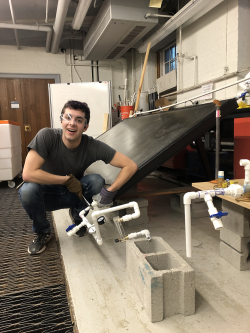
- About
- Education
- Research
- Thought Leadership
- Engagement
- News & Events
Back to Top Nav
Back to Top Nav
Back to Top Nav
Back to Top Nav
Back to Top Nav
Hometown: McLean, VA
Major: Biomedical Engineering Sciences

Noah Daniel '22 knew he wanted to study engineering in college, but, he says, "I did not want that to be my entire life." The other college programs he considered would have required a kind of tunnel-visioned focus on engineering. "I wanted the opportunity to explore and study other things." That emphasis on exploration and interdisciplinary learning, combined with the "compelling enthusiasm" he saw in Dartmouth students when he visited campus, made Dartmouth feel like a good fit.
This spirit of inquiry led Noah to devote himself to a project outside of his major area of focus during his last year at Dartmouth. While he is a biomedical engineering sciences major, an opportunity to work with the Dartmouth Humanitarian Engineers, a student-run engineering club, led him to build new skills in energy and beyond.
The project started with a societal problem: Beacon of Hope, a STEM school in Uganda, was looking for an alternative fuel to the firewood it was using to heat large quantities of water for its kitchen. In addition to being expensive, firewood use for Ugandan institutional kitchens contributes to widespread deforestation in the country and creates deleterious health impacts from smoke exposure. The project team sought to design a solar water heater for the school that could be affordably built and maintained on site.

The team received support for the project via an Irving Institute mini-grant, as well as advising from Institute Senior Advisor Stephen Doig, who, in addition to technical advice, offered his Lyme, New Hampshire property as a place for the team to set up and test their prototype.
Noah described the experience as "pretty fantastic," and recounts how many things he learned outside of his academic area of focus. "It was amazing how much learning there was in so many unexpected ways… like plumbing — I have a lot of respect for plumbers now! And thermodynamics and understanding how to create these efficient energy systems."
New technical skills weren't his only takeaway, though. To be successful, the heater had to work in the specific geographical, economic, and cultural contexts of Uganda. "We had to learn to work with students who have completely different experiences than ours and we had to understand workflows in a different country, as well as the different needs and uses for energy." The team also had to make sure that the solutions they were devising in New Hampshire "had practical applications in Uganda."
Because this was an on-the-job learning experience for Noah and the team, things didn't always go right. But missteps and revisions can be incredibly educational, he says. "I think that was my biggest lesson from Thayer: how to deal with failure! It's going to happen and it's all about what you can learn from it and not be discouraged."
While challenges from the pandemic have complicated the team's collaboration with the Beacon of Hope School, a connection with another school, Uganda Christian University (UCU), was made via Dartmouth alum Richard Ranger '74 and the Irving Institute. The team is planning to travel to UCU in late June 2022, to install the heater and put it to the test in the university's kitchen.
After he gets back from Uganda, Noah will spend the rest of his summer interning for Nanopath, a Boston-based rapid diagnostic nanotechnology firm focused on women's health, started by two Dartmouth PhD students. In the fall he'll be back in Hanover to complete his bachelor of engineering degree at Thayer.
While his summer internship will return his focus to biomedical engineering, working on the solar heater project represents that opportunity to explore that Noah was looking for when he decided to pursue engineering at Dartmouth. He advises new Dartmouth students to stay open to all kinds of opportunities.
"It's ok to spend a lot of time doing research that doesn't seem like it has career applications or relates to your major," he says. "When I started I didn't plan to do anything with energy at all, it didn't feel relevant to my career… I did the DHE project because it was interesting… and now it may impact my career." Ultimately, he says, the best path forward is "have a very open mind to these experiences even if they don't seem really relevant in the immediate term. Just try to keep in mind where they can lead you."